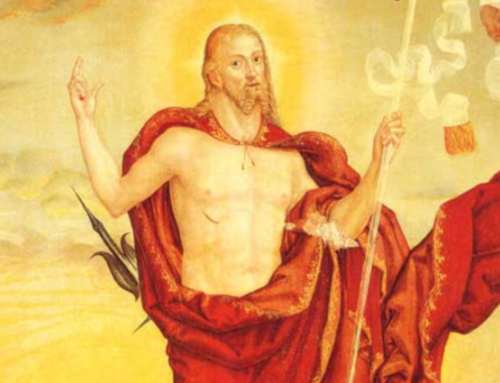In Dante’s vision, fraud is the deepest, most infernal sin, and yet it does not appear at all among the capital sins whose punishments are willingly undergone in “Purgatorio.” Why is that?
Earlier this week, I read a moving essay by Rod Dreher in Touchstone about how he discovered Dante during a hard time in his life. Great poetry allows us to see our own situations with greater clarity and depth, and no poet was greater than Dante. The medieval Florentine poet helped heal Rod’s relation to his own father and strengthen his love of God. We will see many more references to Dante in the next few months, I suspect, because this year marks the 700th anniversary of his death.
At Wyoming Catholic College, Dante’s Commedia—the Divine Comedy—is centrally important to our curriculum. (Our own Jason Baxter has a highly regarded introduction.) Not only does the Commedia take up and transform the classical heritage, giving a structural framework to the Christian imagination, but the dense embeddedness of its characters in historical time and place fills the pages with particular men and women, bad and good, whose situations in the thick of life most resemble our own. Reading the Commedia, generation after generation, helps sustain what is good in our civilization as it exposes whatever is false and cheap.
Some fellow citizens might want to argue that there is no fixed human nature and that we cannot learn anything from something written so long ago, but the poem refutes such a view canto by canto. The reader of the Inferno works his way down through lust, gluttony, avarice, and wrath, none of which seems to have disappeared as yet through social programming; it examines heresy, which thrives in many forms (though unrecognized as such). Dante’s guide, the great Roman poet Virgil, leads Dante down through the three divisions of the Seventh Circle, where Dante finds that the great murderers like Attila the Hun are not quite as bad as the suicides, who are not quite as bad as the sodomites, who are not quite as bad as the people who charge exorbitant interest rates on loans. And at this dizzying point of reconsidering what evil is, Dante makes the great descent into the vast, malodorous cellar of Hell, which contains the many varieties of fraud that constitute almost half of the Inferno.
Bernie Madoff, who died in April, remains the most famous perpetrator of fraud in recent history. What exactly is fraud? The accusations of voter fraud in the past year, to take one example, allege that reported totals have little or no relation to the actual tally of legitimate votes. Whether that claim is true or not, fraud is a lie that raises hopes about some promised good, hopes that turn out to be baseless. At the edge of the precipice between the Seventh Circle and the Eighth, Dante presents the image of fraud embodied in the figure of Geryon:
The face he wore was that of a just man,
so gracious was his features’ outer semblance;
and all his trunk, the body of a serpent…
And all his tail was quivering in the void
while twisting upward its envenomed fork,
which had a tip just like a scorpion’s.
—Inferno XVII: 10-12, 25-27 (Mandelbaum translation)
Fraud is a manipulation of appearances, a use of intelligence to prey upon others’ gracious willingness to believe in friends and neighbors. Art and creativity are human goods, but in fraud they are used to mislead others in a way that works to the deceiver’s advantage.
There are two kinds of fraud, Virgil explains to Dante: fraud against people in general and fraud against those whose “added love” has built “a special trust.” No wonder Dante puts this crime in the bottom of Hell: much more than sins of incontinence or violence, it undercuts the ordinary goodness of human trust on which friendships and communities are based, and it destroys that intimate relation of love that binds people most closely. When Othello thinks that Desdemona has betrayed him, he strikes his chest, feeling the betrayal “there, where I have garner’d up my heart,/Where either I must live, or bear no life.”
If we are deeply convinced of our superiority to the benighted men and women of Dante’s time, it should be embarrassing to admit that such things as fraud still happen. It should be doubly embarrassing to admit that a poet 700 years ago told us to be wary of it. Many college curricula have excised the wisest voices of the tradition, and they have suggested that all villainy lies in one’s participation in, say, the “systemic evil” of racism. But suppose such a teaching is fraudulent? Suppose that the problem is not political at all but spiritual? Suppose that spiritual descendants of the villains of Dante’s depths are walking among us, fostering false hopes, and pulling us into illusions of good? The perpetrator of fraud might be close to us, very close, eliciting genuine expressions of trust and goodwill and receiving our naive friendship with cold satisfaction. The bottom of Dante’s hell is all ice, and the effect on the one who discovers fraud is numbness. As Emily Dickinson put it, “After great pain, a formal feeling comes –/The Nerves sit ceremonious, like Tombs.”
In Dante’s vision, fraud is the deepest, most infernal sin, and yet it does not appear at all among the capital sins whose punishments are willingly undergone in Purgatorio. Why is that? Surely because there can be no fraud against God—against men, certainly, but never against God, Who cannot be deceived. For those who repent, the root causes of fraud lie in human pride and envy and wrath and avarice and sloth, perhaps even in gluttony and lust. Each of these is a choice of self, and in purgatory, the willing renunciation of all the false goods of human desire and antipathy puts one on the sure path to God. Knowing the emptiness of evil is part of what “facing the real” means at Wyoming Catholic College. Without this knowledge, we do not truly appreciate ordinary kindness, the presence of friends, the simple happiness of a community’s trust, the unquestioned love of those closest to us, and the charity that God among us offers as the ultimate guide and guarantor of what is true and just.
Republished with gracious permission from Wyoming Catholic College‘s weekly newsletter.
The Imaginative Conservative applies the principle of appreciation to the discussion of culture and politics—we approach dialogue with magnanimity rather than with mere civility. Will you help us remain a refreshing oasis in the increasingly contentious arena of modern discourse? Please consider donating now.
The featured image is “Dante and Virgil on the back of Geryon,” by Bertel Thorvaldsen, Danish, Copenhagen. This file was donated to Wikimedia Commons as part of a project by the Metropolitan Museum of Art, and appears here courtesy of Wikimedia Commons.








Such a wonderful analysis. I wish I had studied the classics when I was in college. Fantastic final paragraph.
Enlightening essay, Dr. Arbery.
At first glance, comparing crimes of physical pain to those of deception does not even seem reasonable to consider. We’ve become so accustomed to our “justice” system’s hierarchy of sinfulness, that we fail to see what the murder of the human spirit does to us, both individually as well as culturally. Once again, the consequences of living with an overwhelming bent toward materialism raises its ugly head.
Tyrants’ destroy the love, trust and joy of those they control. They divide and destroy for their own personal gain. A segment resists the temptation to fall under their spell, and find love, comfort and wisdom. And those “resisters” – those holders of the truth – become the greatest threat to the regime.
The more we can find the good… the more we can trust those who are trustworthy… the more we live the example…become the greatest challenge to the evil that Dante (and your writing here, so wonderfully brings to light.
Thank you!
“In Dante’s vision, fraud is the deepest, most infernal sin, and yet it does not appear at all among the capital sins whose punishments are willingly undergone in “Purgatorio.” Why is that?”
Fraud is the deepest most infernal sin, because every fraudulent act exchanges The Truth Of Love with a lie.
True, no one can deceive God, The Most Holy And Undivided Blessed Trinity, Through The Unity Of The Holy Ghost, The Author Of Love, Of Life, And Of Marriage, but we do deceive ourselves every time we exchange The Truth Of Love with a lie, and thus we can know through both our Catholic Faith and reason, that lust, is, in essence, Love’s counterfeit, and every time we engage in lustful acts, we exchange The Truth Of Love with that lie that enables us to lust after that lie and become a slave to sin.
From The Catechism Of The Catholic Church:
1849 Sin is an offense against reason, truth, and right conscience; it is failure in genuine love for God and neighbor caused by a perverse attachment to certain goods. It wounds the nature of man and injures human solidarity. It has been defined as “an utterance, a deed, or a desire contrary to the eternal law.”121
1850 Sin is an offense against God: “Against you, you alone, have I sinned, and done that which is evil in your sight.”122 Sin sets itself against God’s love for us and turns our hearts away from it. Like the first sin, it is disobedience, a revolt against God through the will to become “like gods,”123 knowing and determining good and evil. Sin is thus “love of oneself even to contempt of God.”124 In this proud self- exaltation, sin is diametrically opposed to the obedience of Jesus, which achieves our salvation.125“
“According to Pope St. Gregory the Great, the capital vice of lust spawns eight daughters:
Blindness of mind
Thoughtlessness [Inconsiderateness]
Inconstancy
Rashness [Precipitation]
Self-love
Hatred of God
Love of this World [Affection for this present world]
Abhorrence or Despair of a Future World [Dread or despair of that which is to come]”